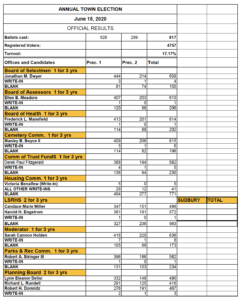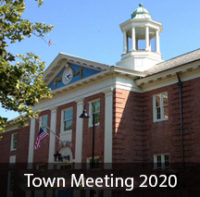 The candidates in the hard-fought Planning Board race had gracious words for each other and said the election was a good experience for the town, even though it became contentious at times.
The candidates in the hard-fought Planning Board race had gracious words for each other and said the election was a good experience for the town, even though it became contentious at times.
“I’d like to congratulate Lynn [DeLisi] and Rick [Rundell] for a good campaign that stuck to the issues,” said Bob Domnitz, who will serve his second stint on the board after winning more votes than Rundell in the three-way race for two seats. “I know some of our supporters were overly enthusiastic, but the candidates took the high road and that’s the way it should be. I’m proud of the entire town for coming out and voting in the numbers they did in this pandemic.”
“I’m impressed that over 800 people felt the issues were important enough to take the trouble to vote under complicated circumstances,” Rundell echoed in a letter posted in LincolnTalk. “I do think an enthusiastically contested election benefits the town by surfacing issues we should be talking about.”
DeLisi, who got the most votes of the three, said she was surprised to finish in first place. “Actually, I thought I would lose,” she said, since much of the campaign discussion focused on Domnitz vs. Rundell rather than DeLisi alone.
DeLisi was co-chair of the South Lincoln Planning and Implementation Committee, a large group with several subcommittees, one of which was the Village Planning and Zoning team. That team’s proposal for rezoning part of South Lincoln and changing the project approval process to give the board more latitude provoked much criticism. But the full SLPIC group rarely met, and DeLisi said she was not even aware of what the zoning team was suggesting until the process was well along.
“I thought the zoning subcommittee was working on ways to make it easier for businesses to open in town… and not focusing on regulations to help developers build dense condos as well,” DeLisi said. “I’ve never chaired a committee where I didn’t know what was going on, and I clearly did not know what was going on,” she said.
Her SLIPC co-chair was Gary Taylor, who was the board’s representative on the zoning subcommittee (and ironically, the person who beat out Domnitz in another close election in 2015).
Domnitz and DeLisi want to see any future zoning change proposals come from the full Planning Board, not SLPAC (the successor to SLPIC) or a subcommittee.
One thing all three candidates agreed on: the discussion about South Lincoln isn’t over.
“My position was that the town should have the conversation — not just a matter of one group shouting it down before everybody had the chance to engage in it,” Rundell said.
“We’re going to have to talk about South Lincoln and how to sustain what we have there. Maybe we do have to change the zoning, but not in the way it was proposed,” DeLisi said. “I think we need to be speaking to the people who live around there and involve them in the conversation.”






